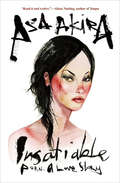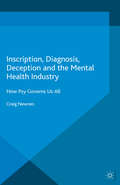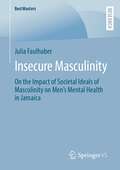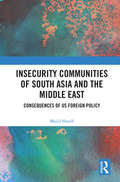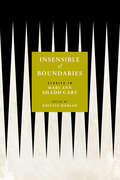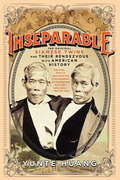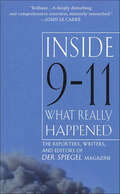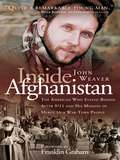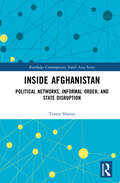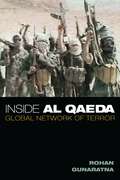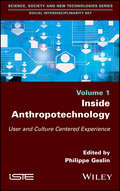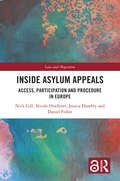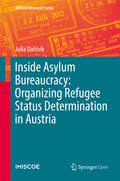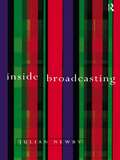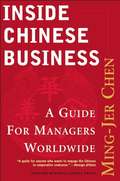- Table View
- List View
Insatiable: Porn–A Love Story
by Asa AkiraA “hot, hilarious, and engrossing” porn star memoir. “Akira is the Galileo of women’s sexuality” (Alissa Nutting, author of Unclean Jobs for Women and Girls). After earning a good living by stripping and working as a dominatrix at a sex dungeon, Asa Akira built up a reputation for being one of the most popular, hardworking, and extreme actors in the porn business, winning dozens of awards for her 330+ movies, including her #1 bestselling series “Asa Akira Is Insatiable.” In Insatiable, Akira recounts her extraordinary life in chapters that are hilarious, shocking, and touching. In a wry, conversational tone, she talks about her experiences shoplifting and doing drugs while in school, her relationship with other porn stars (she is married to one) and with the industry at large, and her beliefs about women and sexuality. Insatiable is filled with Akira’s unusual and often highly amusing anecdotes, including her visit to a New Hampshire sex shop run by a mother and son. One of very few articulate voices writing from the inside, Akira has something important, controversial, and astonishingly interesting to say about sex and its central role in our lives and culture. “Akira is not only passionate about the porn industry, she is shameless, funny and even endearing.” —Susannah Cahalan, New York Post, Best Books of the Year “Each chapter is filled with brutal honesty and self-deprecating humor. It’s touching, inspiring, and flies in the face of a lot of people’s preconceptions about the life of an adult film star.” —Vice “Her book is a lot like her porn: raw, brutal and always unflinching.” —Salon.com
Inscription, Diagnosis, Deception and the Mental Health Industry: How Psy Governs Us All
by Craig NewnesThe Psy complex governs us all by inscribing, diagnosing and interfering in our lives. This volume takes historical, sociological and psychological perspectives in exploring the complicity of patients, professions and governments with Psy and attempts by all three to constrain the industry's activities.
Insect Media: An Archaeology of Animals and Technology (Posthumanities #11)
by Jussi ParikkaSince the early nineteenth century, when entomologists first popularized the unique biological and behavioral characteristics of insects, technological innovators and theorists have proposed insects as templates for a wide range of technologies. In Insect Media, Jussi Parikka analyzes how insect forms of social organization-swarms, hives, webs, and distributed intelligence-have been used to structure modern media technologies and the network society, providing a radical new perspective on the interconnection of biology and technology.Through close engagement with the pioneering work of insect ethologists, including Jakob von Uexküll and Karl von Frisch, posthumanist philosophers, media theorists, and contemporary filmmakers and artists, Parikka develops an insect theory of media, one that conceptualizes modern media as more than the products of individual human actors, social interests, or technological determinants. They are, rather, profoundly nonhuman phenomena that both draw on and mimic the alien lifeworlds of insects. Deftly moving from the life sciences to digital technology, from popular culture to avant-garde art and architecture, and from philosophy to cybernetics and game theory, Parikka provides innovative conceptual tools for exploring the phenomena of network society and culture. Challenging anthropocentric approaches to contemporary science and culture, Insect Media reveals the possibilities that insects and other nonhuman animals offer for rethinking media, the conflation of biology and technology, and our understanding of, and interaction with, contemporary digital culture.
Insectopedia: Ren Lei Xue Jia Guan Kan Chong Chong De 26 Zhong Fang Shi = Insectopedia
by Hugh RafflesMeditating on our relationship to bugs, Raffles set himself the task of writing an A to Z encyclopedia of a very personal sort, in which he records his thoughts on specific points of insect behavior, strange human behavior involving insects, and human's interests in insects' behaviors based on their own strange predilections. Chinese cricket fights, Himmler's grotesque characterization of Jews as lice, queer sex among insects and animals, and Sahelian locust swarms as another fatal threat in war-ravaged Niger, are among the unlikely and fascinating topics. Annotation ©2010 Book News, Inc. , Portland, OR (booknews. com)
Insects and Human Life
by Brian MorrisThis pioneering book looks at the importance of insects to culture. While in the developed West a good deal of time and money may be spent trying to exterminate insects, in other cultures human-insect relations can be far more subtle and multi-faceted. Like animals, insects may be revered or reviled - and in some tribal communities insects may be the only source of food available. How people respond to, make use of, and relate to insects speaks volumes about their culture. In an effort to get to the bottom of our vexed relationship with the insect world, Brian Morris spent years in Malawi, a country where insects proliferate and people contend. In Malawi as in many tropical regions, insects have a profound impact on agriculture, the household, disease and medicine, and hence on oral literature, music, art, folklore, recreation and religion. Much of the complexity of human-insect relations rests on paradox: insects may represent the source of contagion, but they are also integral to many folk remedies for a wide range of illnesses. They may be at the root of catastrophic crop failure, but they can also be a form of sustenance. Weaving science with personal observations, Morris demonstrates a profound and intimate knowledge of virtually every aspect of human-insect relations. Not only is this book extraordinarily useful in terms of the more practical side of entomology, it also provides a wealth of information on the role of insects in cultural production. Malawian proverbs alone provide many such delightful examples - 'Bemberezi adziwa nyumba yake' ('The carpenter bee knows his own home'). This final volume in Morris' trilogy on Malawi's animal and insect worlds is certain to become a classic study of uncharted territory - the insect world that surrounds us and how we relate to it. Praise for The Power of Animals.
Insecure Masculinity: On the Impact of Societal Ideals of Masculinity on Men's Mental Health in Jamaica (BestMasters)
by Julia FaulhaberThis work focuses on the relationship between childhood socialization, masculinities, and young men’s coming of age in contemporary Jamaica. The author elucidates social, cultural, and historical dimensions of young men’s lifeworlds and theorizes on the potential trajectories of being emotionally well and/or un-well vis-à-vis gendered normative orders of growing up and relating to others within and beyond kinship and courtship relations. Based on fieldwork, this book elaborates on the extent to which social discourses of masculinity and men’s personal experiences of their own and other men’s mental health are reproduced in Jamaica. Faulhaber places her work in contemporary psychological and medical anthropology and aims to overcome the separation of psyche, body, and environment that is often common in psychotherapy, psychiatry, and health sciences. The author embarks on this important endeavour through critical and self-reflexive ethnography and the analysis of hegemonic narratives and discourses in media and popular culture. In juxtaposition and extension to other global mental health initiatives, this work highlights that well-being, affliction and suffering can barely be grasped scientifically as objectively measurable mental states of the individual.
Insecure Prosperity: Small-Town Jews in Industrial America, 1890-1940
by Ewa MorawskaThis captivating story of the Jewish community in Johnstown, Pennsylvania reveals a pattern of adaptation to American life surprisingly different from that followed by Jewish immigrants to metropolitan areas. Although four-fifths of Jewish immigrants did settle in major cities, another fifth created small-town communities like the one described here by Ewa Morawska. Rather than climbing up the mainstream education and occupational success ladder, the Jewish Johnstowners created in the local economy a tightly knit ethnic entrepreneurial niche and pursued within it their main life goals: achieving a satisfactory standard of living against the recurrent slumps in local mills and coal mines and enjoying the company of their fellow congregants. Rather than secularizing and diversifying their communal life, as did Jewish immigrants to larger cities, they devoted their energies to creating and maintaining an inclusive, multipurpose religious congregation. Morawska begins with an extensive examination of Jewish life in the Eastern European regions from which most of Johnstown's immigrants came, tracing features of culture and social relations that they brought with them to America. After detailing the process by which migration from Eastern Europe occurred, Morawska takes up the social organization of Johnstown, the place of Jews in that social order, the transformation of Jewish social life in the city, and relations between Jews and non-Jews. The resulting work will appeal simultaneously to students of American history, of American social life, of immigration, and of Jewish experience, as well as to the general reader interested in any of these topics.
Insecurity (21st Century Studies)
by Richard GrusinInvestigating insecurity as the predominant logic of life in the present moment Challenging several key concepts of the twenty-first century, including precarity, securitization, and resilience, this collection explores the concept of insecurity as a predominant logic governing recent cultural, economic, political, and social life in the West. The essays illuminate how attempts to make human and nonhuman systems secure and resilient end up having the opposite effect, making insecurity the default state of life today.Unique in its wide disciplinary breadth and variety of topics and methodological approaches—from intellectual history and cultural critique to case studies, qualitative ethnography, and personal narrative—Insecurity is written predominantly from the viewpoint of the United States. The contributors&’ analyses include the securitization of nongovernmental aid to Palestine, Bangladeshi climate refugees, and the privatization of U.S. military forces; the history of the concept of insecurity and the securitization of finance; racialized urban development in Augusta, Georgia; Amazon&’s Mechanical Turk and the consequences of the Marie Kondo method; and the intricate politics of sexual harassment in the U.S. academy.Contributors: Neel Ahuja, U of California, Santa Cruz; Aneesh Aneesh, U of Wisconsin, Milwaukee; Lisa Bhungalia, Kent State U; Jennifer Doyle, U of California, Riverside; Annie McClanahan, U of California, Irvine; Andrea Miller, Florida Atlantic U; Mark Neocleous, Brunel U London; A. Naomi Paik, U of Illinois, Chicago; Maureen Ryan, U of South Carolina; Saskia Sassen, Columbia U.
Insecurity Communities of South Asia and the Middle East: Consequences of US Foreign Policy
by Majid SharifiThis book critically examines how US foreign policy has produced a regional regime of instability and insecurity in South Asia and the Middle East. It focuses on three interconnected zones of conflict—Afghanistan and Pakistan in South Asia, Iran and the Persian Gulf states, and Iraq and its neighbours. In a comprehensive historical survey, this work compares the governing behaviour of these states with that of the West, where the American foreign policy establishment has, in contrast, pushed for investing in collective security. The author studies various events throughout history such as the Taliban regime; the US-led war in Afghanistan; the Obama administration and Pakistan; the first and second Gulf wars; the Arab Spring, and the rise of ISIS to present a theoretical analysis of Washington’s consistent pursuit of multibalancing and regime change wars in the region. An important critical assessment of Western foreign policies, this book will be indispensable for students and researchers of US foreign policy, defense and security studies, strategic affairs, politics and international relations, political economy, nation-state building, identity studies, globalization studies, Middle East studies, and South Asian studies.
Inselwelten: Eine kulturgeographische Erkundung
by Werner KreiselInseln haben nicht nur Wissenschaft und Kunst, sondern die gesamte Menschheit seit jeher fasziniert. Sie regen die Phantasie an und erwecken die Sehnsucht nach Ferne, Fremde und Exotik. Auch die Tourismusbranche hat das lange erkannt und stellt das romantische Inselgefühl ins Zentrum ihrer Werbung für Traumurlaube im „Paradies“. Große Denker haben ihre Überlegungen zu einem idealen Staatswesen an entlegenen, utopischen Inseln festgemacht. Um viele Inseln ranken sich Sagen und Legenden. Doch sind Inseln mehr als Urlaubsträume und Fiktionen: Manche sind Standort von Hochkulturen, andere wurden zu internationalen Finanzplätzen, wieder andere zu kriminellen Steueroasen. Inseln spielten eine entscheidende Rolle für Entdeckungsfahrten, sie schufen die Motivation für richtungsweisende wissenschaftliche Erkenntnisse, wie die Evolutionstheorie. Inseln waren und sind immer bei geostrategischen Konfrontationen beteiligt und blieben auch von innenpolitischen Konflikten nicht verschont. Für viele Flüchtlinge sind Inseln oft die ersten sicheren Anlaufstellen nach einer gefährlichen Seefahrt. Und gleichzeitig dienen Inseln seit jeher als Exil oder Gefängnis, vor allem, wenn sie so „isoliert“ waren, dass eine Flucht unmöglich schien. Eigentlich sind Inseln „nur“ von Wasser umgebenes Land. Doch der Begriff kann auch auf Sprach- und Kulturinseln, auf ethnisch oder sozial segregierte Wohngebiete sowie religiös geprägte „Inseln der Meditation“ ausgeweitet werden. Das vorliegende Buch versteht sich als eine „kulturgeographische Erkundung“: Es wählt diejenigen kulturellen, gesellschaftlichen und politischen Aspekte aus, die am Beispiel von Inseln besonders gut veranschaulicht werden können. Das Buch richtet sich nicht nur an wissenschaftlich interessierte Leserinnen und Leser, sondern auch an Menschen, die aus eigener Erfahrung eine besondere Beziehung zu Inseln haben. Auch für potenzielle Inselbesucherinnen und -besucher, die sich intensiver mit der Thematik auseinandersetzen wollen, ist dieses Buch gedacht. Schließlich sollen die Leserinnen und Leser auch dazu ermuntert werden, sich aus ihren eigenen Blickwinkeln selbständig weiterführende Gedanken zum Thema „Inselwelten“ zu machen.
Insensible of Boundaries: Studies in Mary Ann Shadd Cary (Black Print and Organizing in the Long Nineteenth Century)
by Kristin MoriahThe first collection of essays published on trailblazing nineteenth-century Black feminist, activist, journal, and educator, Mary Ann Shadd CaryMary Ann Shadd Cary (1823–1893) was a trailblazing Black feminist, activist, journalist, and educator whose achievements can be traced across Canada and the United States. Born in a border state in the antebellum era, Shadd Cary taught in schools in New York, New Jersey, and Pennsylvania before becoming a strong advocate for immigration to Canada in her early adulthood. Once she moved to Ontario in the mid-1850s, she dove headfirst into early Black Canadian debates. She fought to integrate schools in the States and Canada and became, as the editor of the Provincial Freeman, the first Black woman to edit a newspaper in North America.Despite her achievements and impact on Black life in North America, Shadd Cary is a relatively little-known figure outside of the continent. Insensible of Boundaries is the first collection of essays published on this thinker. With this volume, editor Kristin Moriah brings together eleven essays from a broad range of perspectives, including historical, literary, gender, ecological, bibliographical, visual, sound, and performance studies, on nineteenth-century Black feminist inquiry in North America.The volume focuses particularly on three main topics: Shadd Cary’s relationship to immigration, nation, and colonization; the Black creative and nation-building work that Shadd Cary has inspired; and contemporary research methodologies like digital humanities as they can be used to better understand Shadd Cary’s moment, impacts, and life. Through a multi- and interdisciplinary lens, the collection celebrates Shadd Cary’s cultural significance and intellectual contributions, as well as their reverberations in her time and in ours.Contributors: R. J. Boutelle , Jim Casey, Rosalyn Green, Lauren Klein, Kirsten Lee, Brandi Locke, Demetra McBrayer, A. T. Moffett, Kristin Moriah, Dianna Ruberto, Lynnette Young Overby, Eunice Toh, Rinaldo Walcott, Marlas Yvonne Whitley, Jewon Woo.
Inseparable: The Original Siamese Twins And Their Rendezvous With American History
by Yunte HuangWith wry humor, Shakespearean profundity, and trenchant insight, Yunte Huang brings to life the story of America’s most famous nineteenth-century Siamese twins. Nearly a decade after his triumphant Charlie Chan biography, Yunte Huang returns with this long-awaited portrait of Chang and Eng Bunker (1811–1874), twins conjoined at the sternum by a band of cartilage and a fused liver, who were “discovered” in Siam by a British merchant in 1824. Bringing an Asian American perspective to this almost implausible story, Huang depicts the twins, arriving in Boston in 1829, first as museum exhibits but later as financially savvy showmen who gained their freedom and traveled the backroads of rural America to bring “entertainment” to the Jacksonian mobs. Their rise from subhuman, freak-show celebrities to rich southern gentry; their marriage to two white sisters, resulting in twenty-one children; and their owning of slaves, is here not just another sensational biography but a Hawthorne-like excavation of America’s historical penchant for finding feast in the abnormal, for tyrannizing the “other”—a tradition that, as Huang reveals, becomes inseparable from American history itself.
Inside 9-11: What Really Happened
by Der SpiegelThe award-winning news publication presents their groundbreaking 9/11 reporting: “A deeply disturbing and comprehensive overview” (John le Carré).Some of the finest writing and reporting on the events of September 11th was done by Der Spiegel, Germany’s magazine of record. With its main office in Hamburg, base of operations for terrorist ringleader Mohamed Atta and many of the others, Der Spiegel’s journalists were on the front lines of the earliest investigation into the identities of those who brought holy war to America.Spiegel was also at Ground Zero, gathering stories, interviewing survivors, and documenting the interconnections of horror and heroism. Inside 9-11 gives us some of these first-person accounts, taking us as close as we can get to what happened.The “why” of September 11th may remain beyond understanding. But here we learn who the terrorists were, and how they were able to take so many innocent lives by sacrificing their own. The profiles in this book render a chilling, alien mindset that has become part of our daily reality. Combining first-class investigative journalism and writing of great clarity, Inside 9-11 is a heartbreaking and gripping reconstruction of the events that changed us all.
Inside Afghanistan
by John WeaverHe is living what many would call a nightmare. John Weaver is serving God in a war-torn country that is being blamed for the terrorist acts on American soil. Despite the fact that every day is dangerous and possibly life-threatening, John Weaver believes he sees God at work in Afghanistan and he is optimistic about its spiritual future. Inside Afghanistan is the story of the Taliban and September 11, as only this servant of God can tell it. John Weaver was there as the last American aid worker in the hostile country he now calls home. He is witness to God's ability to use ordinary Christians in the U.S. to "spread the Gospel of Jesus Christ to a country that otherwise wouldn't have had the opportunity." This is John Weaver's riveting account of why he went and why he wouldn't leave.
Inside Afghanistan: Political Networks, Informal Order, and State Disruption (Routledge Contemporary South Asia Series)
by Timor SharanThis book maps out how political networks and centres of power, engaged in patronage, corruption, and illegality, effectively constituted the Afghan state, often with the complicity of the U.S.-led military intervention and the internationally directed statebuilding project. It argues that politics and statehood in Afghanistan, in particular in the last two decades, including the ultimate collapse of the government in August 2021, are best understood in terms of the dynamics of internal political networks, through which warlords and patronage networks came to capture and control key sectors within the state and economy, including mining, banking, and illicit drugs as well as elections and political processes. Networked politics emerged as the dominant mode of governance that further transformed and consolidated Afghanistan into a networked state, with the state institutions and structures functioning as the principal “marketplace” for political networks’ bargains and rent-seeking. The façade of state survival and fragmented political order was a performative act, and the book contends, sustained through massive international military spending and development aid, obscuring the reality of resource redistribution among key networked elites and their supporters. Overall, the book offers a way to explain what it was that the international community and the Afghan elites in power got so wrong that brought Afghanistan full circle and the Taliban back to power.
Inside African Anthropology
by Andrew Bank Leslie J. BankInside African Anthropology offers an incisive biography of the life and work of South Africa's foremost social anthropologist, Monica Hunter Wilson. By exploring her main fieldwork and intellectual projects in southern Africa between the 1920s and 1960s, the book offers insights into her personal and intellectual life. Beginning with her origins in the remote Eastern Cape, the authors follow Wilson to the University of Cambridge and back into the field among the Mpondo of South Africa, where her studies resulted in her 1936 book Reaction to Conquest. Her fieldwork focus then shifted to Tanzania, where she teamed up with her husband, Godfrey Wilson. In the 1960s, Wilson embarked on a new urban ethnography with a young South African anthropologist, Archie Mafeje, one of the many black scholars she trained. This study also provides a meticulously researched exploration of the indispensable contributions of African research assistants to the production of this famous woman scholar's cultural knowledge about mid-twentieth-century Africa.
Inside Anthropotechnology: User and Culture Centered Experience
by Philippe GeslinFor the last forty years, anthropotechnology has been concentrating its efforts on the study and improvement of the working and living conditions of populations throughout the world. It guides the actors of the design processes by paying attention to the "human factor", its social, cultural and environmental components. It therefore values a conception of techniques that respect people, their ways of thinking and acting in specific contexts. This book introduces the reader into design dynamics that combine often conflicting sets of competencies, but always anxious to respond to the contexts of the field.
Inside Asylum Appeals: Access, Participation and Procedure in Europe (Law and Migration)
by Daniel Fisher Nick Gill Nicole Hoellerer Jessica HamblyAppeals are a crucial part of Europe’s asylum system but they remain poorly understood. Building on insights and perspectives from legal geography and socio-legal studies, this book shines a light on what takes place during asylum appeals and puts forward suggestions for improving their fairness and accessibility. Drawing on hundreds of ethnographic observations of appeal hearings, as well as research interviews, the authors paint a detailed picture of the limitations of refugee protection available through asylum appeals. Refugee law can appear dependable and reliable in policy documents and legal texts. However, this work reveals that, in reality, myriad social, political, psychological, linguistic, contextual and economic factors interfere with and frequently confound the protection that refugee law promises during its concrete enactment. Drawing on evidence from Austria, Belgium, France, Germany, Greece, Italy and the United Kingdom, the book equips readers with a clear sense of the fragility of legal protection for people forced to migrate to Europe. The book will appeal to scholars of migration studies, legal studies, legal geography and the social sciences generally, as well as practitioners in asylum law throughout Europe and beyond.This book is freely available as a downloadable Open Access PDF at http://www.taylorfrancis.com under a Creative Commons Attribution-Non Commercial-No Derivatives (CC-BY-NC-ND) 4.0 license.
Inside Asylum Bureaucracy: Organizing Refugee Status Determination in Austria (IMISCOE Research Series)
by Julia DahlvikThis open access monograph provides sociological insight into governmental action on the administration of asylum in the European context. It offers an in-depth understanding of how decision-making officials encounter and respond to structural contradictions in the asylum procedure produced by diverging legal, political, and administrative objectives.The study focuses on structural aspects on the one hand, such as legal and organisational elements, and aspects of agency on the other hand, examining the social practices and processes going on at the frontside and the backside of the administrative asylum system.Coverage is based on a case study using ethnographic methods, including qualitative interviews, participant observation, as well as artefact analysis. This case study is positioned within a broader context and allows for comparison within and beyond the European system, building a bridge to the international scientific community.In addition, the author links the empirical findings to sociological theory. She explains the identified patterns of social practice in asylum administration along the theories of social practices, social construction and structuration. This helps to contribute to the often missing theoretical development in this particular field of research.Overall, this book provides a sociological contribution to a key issue in today's debate on immigration in Europe and beyond. It will appeal to researchers, policy makers, administrators, and practitioners as well as students and readers interested in immigration and asylum.
Inside Book Publishing
by Angus Phillips Giles ClarkNow in its fifth edition, Inside Book Publishing remains the classic introduction to the book publishing industry, being both a manual for the profession for over two decades and the bestselling textbook for students of publishing. This new edition has been fully updated to respond to the rapid changes in the market and technology. Now more global in its references and scope, the book explores the tensions and trends affecting the industry, including the growth of ebooks, self-publishing, and online retailing, and new business models and workflows. The book provides excellent overviews of the main aspects of the publishing process, including commissioning, product development, design and production, marketing, sales and distribution. The book remains essential reading for publishing students, those seeking a career in publishing, recent entrants to the industry, and authors seeking an insider's view. The accompanying website supports the book by providing up-to-date and relevant content.
Inside Book Publishing
by Angus Phillips Giles ClarkNow fully revised and updated for its sixth edition, Inside Book Publishing is the classic introduction to the book publishing industry. Giles Clark and Angus Phillips offer authoritative coverage of all sectors of the industry from commercial fiction and non-fiction to educational publishing and academic journals. They reveal how publishers continue to adapt to a fast-changing and highly interconnected world, in which printed books have proved resilient alongside ebooks and the growth in audio. Major themes are explored, including the development of digital products and the use of social media in book marketing; and those that affect publishers’ businesses such as the rise of internet retailing, rental models for student textbooks, and open access where academic content is free to the user. Case studies from industry experts give fascinating perspectives on topics such as crowdfunding, self-publishing and how authors can market themselves. The book provides excellent overviews of the main aspects of the publishing process: commissioning authors, product development, design and production, marketing, sales and distribution. As a manual for those in the profession and a guide for the potential publishers of the future, Inside Book Publishing remains a seminal work for anyone with an interest in the industry. It will also be of interest to authors seeking an insider’s view of this exciting industry. Companion website: www.insidebookpublishing.com
Inside Book Publishing
by Angus Phillips Giles ClarkNow fully revised and updated for its seventh edition, Inside Book Publishing is the classic introduction to the book publishing industry.The book provides excellent overviews of the main aspects of the publishing process: commissioning authors, product development, design and production, marketing, and sales. Angus Phillips and Giles Clark offer authoritative and up-to-date coverage of all sectors of the industry from commercial fiction to educational publishing and academic journals. They reveal how publishers continue to adapt to a fast-changing and highly interconnected world, in which printed books have proved resilient alongside ebooks and the growth in audio. The topics explored include AI, social media in marketing, sustainable book production, open access for research, and diversity, equity and inclusion. International case studies from industry experts give perspectives on, for example, comic books, children’s picture books, women in Indian publishing and the Korean literary wave.As a manual for those in the profession and a guide for the publishers of the future, this book remains a seminal work for anyone with an interest in the industry. It will also be of interest to authors seeking an insider’s view of this exciting industry.The book is supported by online resources, including a glossary, a further reading list and links to a range of online resources, available at www.routledge.com/9781032516554.
Inside Broadcasting
by Julian NewbyInside Broadcasting provides a comprehensive introduction to a highly rewarding yet competitive industry. It analyses the day-to-day running of both television and radio organisations and examines the jobs involved and how to get them.Inside Broadcasting begins with an informative history of broadcasting in the United Kingdom. It traces the invention of radio and television, from the founding of the BBC and ITV networks through to the end of the terrestrial monopoly and the advent of satellite and pay-per-view television.Julian Newby explains what skills, experience and professional qualifications are required for entry into this profession. He provides detailed job descriptions and explains how each job fits into the industry as a whole. Practical careers advice together with a comprehensive list of training and educational bodies, companies and professional publications ensure Inside Broadcasting is an essential introduction to a career in radio and television.
Inside Chinese Business: A Guide For Managers Worldwide
by Ming-Jer ChenChen (Management, Chinese University of Hong Kong and Imperial College of Science, Technology, and Medicine--England) offers Western managers advice on navigating the Chinese business world. He explains the cultural and social principles underlying Chinese business organizations and their dynamics, illustrating his analysis with examples drawn from Asian and North American businesses. Communication patterns, networking, negotiation, competition, and the structure of China's transition economy are all discussed.
